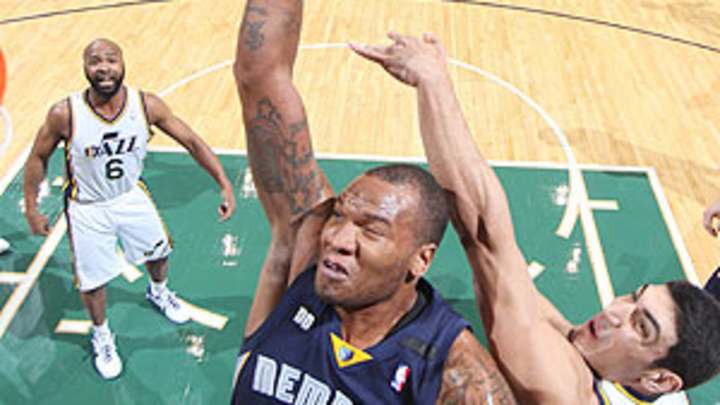Grizz clear tax line in deal with Cavs

Memphis traded Marreese Speights in order to clear the luxury tax line. (Melissa Majchrzak/NBAE via Getty Images)
By Rob Mahoney
All of the recent Rudy Gay trade rumors and speculation could be traced to a single financial truth: The Grizzlies were about $4 million over the luxury tax line this season and were very much interested in ducking underneath that threshold, both for the sake of some immediate savings and their long-term flexibility.
The current collective bargaining agreement has brought a brutal penalty on those teams that pay the tax on a regular basis, and with a four-man core that pulls in more than $54 million in salary this year (and stands to make even more in seasons to come), it made sense for Memphis to consider its assets carefully and avoid paying the tax if at all possible. Trading Gay for depth and more affordable contracts was seen as one way to achieve that goal, but as was made abundantly clear on Tuesday, it was far from the only way.
The Grizzlies have traded Marreese Speights, Wayne Ellington, Josh Selby and a future protected first-round pick to Cleveland in exchange for Jon Leuer. All of the pieces involved make very clear, straightforward sense in the context of the Grizzlies' needs both in their cap ledger and on the court, beginning with the fact that they've now cleared the luxury tax line by almost $2.5 million -- enough to safely sign a pair of players to minimum deals and avoid the tax. If we break down contract by contract, Speights ($4.2 million) essentially represents the cost of getting under the tax line, Selby ($762,195) is a dollar-for-dollar swap for Leuer (who will functionally replace Speights) and Ellington ($2.1 million) is included to give the Cavaliers an extra shooter.
Trading out Speights for Leuer is about as lateral as NBA moves get, in that both serve the exact same purpose to very similar degrees of effectiveness. Neither is a great (or even particularly good) defender, but provide offensive value because of their ability to convert mid-range jump shots and space the floor for pick-and-roll/post-up action. Memphis sacrifices some rebounding in moving from Speights to Leuer, but ultimately preserves the value of that role by acquiring a player with a roughly equivalent skill set. To accomplish all of that while sneaking under the tax line and keeping Gay (for the time being, anyway) is a nice maneuver.
For the Cavs, the payoff doesn't come with Selby or Ellington, but in the assets created from their cap space. As one of the few teams under the salary cap, Cleveland was in position to absorb Speights' deal (and thus acquire a rotation-caliber big man) for the price of a future draft pick -- one that only adds to the Cavs' current stash of assets. As clarified by Ken Berger of CBS Sports, the pick acquired is originally slotted for 2015, though because of protections it may not pay off until 2017 or '18 (when the pick will be only top-five protected). That's some long-term game-planning for a team that has plenty of immediate needs, but a smart play to acquire an asset that could turn out to be rather substantial. The longer that pick stews the more likely it is to pay off handsomely for the Cavs, making it the kind of piece that could give an already competitive team (which Cleveland may well be by 2017) a significant boost outside of typical channels.

Rob Mahoney is an NBA writer dedicated to the minutiae of the game of basketball, its overarching themes and everything in between. He joined the Sports Illustrated staff in 2012.